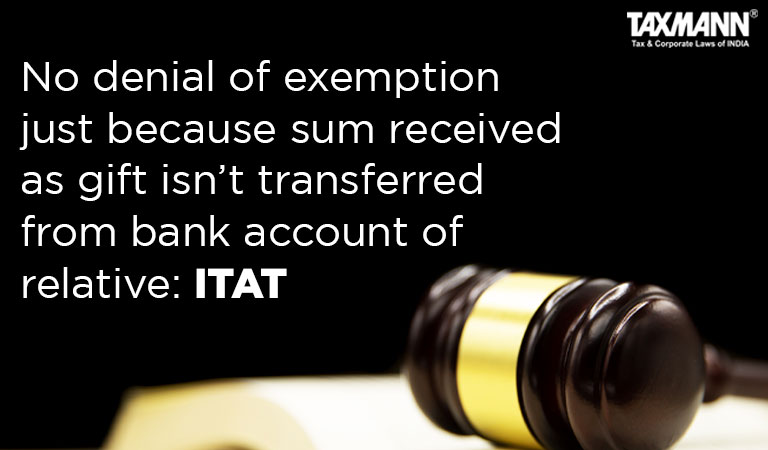No denial of exemption just because sum received as gift isn’t transferred from bank account of relative: ITAT
- Blog|News|Income Tax|
- 2 Min Read
- By Taxmann
- |
- Last Updated on 9 November, 2022

Case Details: P. Srinivasan v. ITO - [2022] 144 taxmann.com 141 (Chennai-Trib.)
Judiciary and Counsel Details
-
- V. Durga Rao, Judicial Member & Manoj Kumar Aggarwal, Accountant Member
- S. Sridhar and Tarun G., Advs. for the Appellant.
- G. Johnson for the Respondent.
Facts of the Case
Assessee was a proprietor of rice mills. During the relevant assessment year, a scrutiny assessment under section 143(3) was conducted and it was found that assesse received a gift of Rs. 50 lacs from his paternal uncle. However, such gift was received from the bank account of the son and daughter-in-law of the uncle.
Considering the fact that the gift is not received from the bank account of the uncle, the Assessing Officer (AO) denied the exemption available under section 56(2)(vii). AO stated that the son and daughter-in-law of the parental uncle are not covered under the term “relatives”. Thus, the sum received from them is to be treated as income of assessee.
On appeal, the CIT(A) upheld the order of AO. Aggrieved-assessee filed the instant appeal before the Tribunal.
ITAT Held
The Tribunal held that the term ‘relative’ as defined under section 56(2)(vii) includes the brother or sister of either of the parents. Thus, the assessee’s uncle falls within the term ‘relative’.
In the instant case, the only reason to deny the exemption to the assessee was that the gift amount was transferred from the bank accounts of the son and daughter-in-law of the uncle.
The son and daughter-in-law are not alien to the uncle but very close relatives of the uncle and it could be understood that the gift was first provided by them to the uncle and then transferred by the uncle to the assessee. Thus, it can be considered a ‘Constructive Gift’ from the uncle.
The uncle had also confirmed the grant of gift to the assessee and the transfer happened on the instructions of the uncle. Thus, the gift so received by assessee was eligible for exemption under section 56(2)(vii).
Disclaimer: The content/information published on the website is only for general information of the user and shall not be construed as legal advice. While the Taxmann has exercised reasonable efforts to ensure the veracity of information/content published, Taxmann shall be under no liability in any manner whatsoever for incorrect information, if any.

Taxmann Publications has a dedicated in-house Research & Editorial Team. This team consists of a team of Chartered Accountants, Company Secretaries, and Lawyers. This team works under the guidance and supervision of editor-in-chief Mr Rakesh Bhargava.
The Research and Editorial Team is responsible for developing reliable and accurate content for the readers. The team follows the six-sigma approach to achieve the benchmark of zero error in its publications and research platforms. The team ensures that the following publication guidelines are thoroughly followed while developing the content:
- The statutory material is obtained only from the authorized and reliable sources
- All the latest developments in the judicial and legislative fields are covered
- Prepare the analytical write-ups on current, controversial, and important issues to help the readers to understand the concept and its implications
- Every content published by Taxmann is complete, accurate and lucid
- All evidence-based statements are supported with proper reference to Section, Circular No., Notification No. or citations
- The golden rules of grammar, style and consistency are thoroughly followed
- Font and size that’s easy to read and remain consistent across all imprint and digital publications are applied



 CA | CS | CMA
CA | CS | CMA
